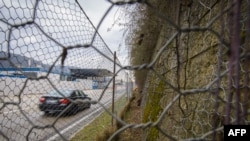Austria's centrist coalition government on Tuesday agreed on a draft law that would allow authorities to stop providing accommodation and food to rejected asylum seekers who refuse to leave the country.
The bill, which parliament must still approve, is part of a wider reform of laws dealing with foreigners in Austria, which includes fines or prison sentences for migrants who lie about their identity.
The Austrian government is preparing a package of policies aimed at countering the rise of the far-right Freedom Party, whose candidate came close to winning the presidential election in December.
Migrants who are denied asylum and refuse to leave will have to face the consequences, Interior Minister Wolfgang Sobotka said.
"The first thing is basically that they don't get anything from the Austrian state if they don't have the right to stay here. Is that so hard to understand?" Sobotka told reporters.
He said the draft law was designed to encourage rejected asylum seekers to leave voluntarily.
Migration crisis
Austria took in roughly 90,000 asylum seekers in 2015, more than 1 percent of its population, as it was swept up in Europe's migration crisis when hundreds of thousands of people crossed its borders, most on their way to Germany.
It has since tightened immigration restrictions and helped shut down the route through the Balkans by which almost all those people — many of them fleeing war and poverty in the Middle East and elsewhere — arrived. Asylum applications fell by more than half last year.
Asylum seekers in Austria get so-called basic services, including free accommodation, food, access to medical treatment and 40 euros ($42.41) of pocket money a month.
Sobotka said that of about 4,000 people who receive basic services but should have left the country, 2,000 could be affected if the law is passed, because they are healthy enough to travel to their home countries.
The Austrian office of the U.N. High Commissioner for Refugees said the bill was "highly questionable" and urged lawmakers to think hard about agreeing to it.
The bill would make asylum applicants who lie about their identities face fines of up to 5,000 euros or three weeks in jail.
Rejected asylum seekers in 2016 were most often from Afghanistan, Pakistan and Nigeria, Interior Ministry data showed.






